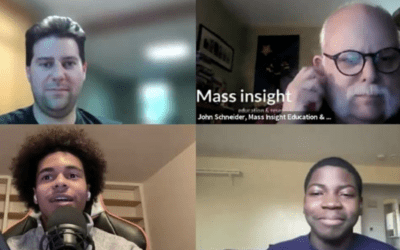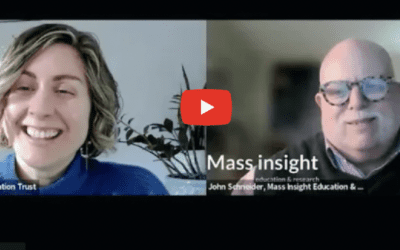The Boulder Fund grant will allow Mass Insight to pilot a new program targeting middle school readiness. May. 22, 2025 –Boston– Mass Insight Education & Research’s President and CEO, Andrea Wolfe, has been selected in the 2025 cohort of Education Leaders of...
Considerations for Districts who are Exploring Equity Audits
At Mass Insight, we believe an equity audit is an important step in creating a more equitable working and learning environment for your staff, students, and families. Here are four questions for districts to consider to ensure equity audits are impactful and supportive of districts in their journey toward greater equity:
- Why an equity audit now?Recent events, including the COVID-19 pandemic and social and racial injustices, have impacted all communities and schools differently and in a myriad of ways. It is important to consider recent events, as well as district and community trends in the last 5-10 years that have impacted schools and highlighted inequitable outcomes, practices, or policies and the need to do something about them. It is also important for district, school, and community leaders to consider the desired outcomes of an equity audit and how an equity audit process could support the district’s forward movement on its equity journey.
- What is the readiness of leaders for driving equity forward?It is important to consider the extent to which district and school leaders are prepared to lead equity work. Mass Insight perceives equity as a journey, not a destination, and recognizes the intentionality required by organizations to maximize and sustain equity work. Equity audits can be used to both invest leadership in the need for more equitable policies and practices and to expand the actualization of those policies and practices. Understanding where leadership is in its journey will support a clearer purpose and awareness of district readiness to accept and address inequities.
- How does the district envision an equity audit impacting its district priorities?
With a commitment to pursuing equity, the next consideration is how that might look and be brought to life. Most districts and schools have strategic or improvement plans, so it is worthwhile to consider the extent to which those plans already reflect the district’s commitment to equity and how the district and schools envision becoming more explicit about the ways in which equity-based decisions and practices might impact plans and systems of accountability. - How does the district envision engaging staff, students, families, and community in the audit process and recommendations?
Understanding how equity is perceived and experienced by all stakeholder groups, particularly those in marginalized populations, is a critical component of equity audits. Districts and schools are responsible for addressing equitable access, inclusivity, and success, but the outcomes and impacts are experienced by staff, students, families, and the greater community. Engaging marginalized populations in the creation and implementation of more equitable policies and practices that result from an equity audit is critical to ensure all stakeholder voices are included in the equity audit journey. Finally, it is important to reflect on current engagement practices and successes, as well as envision what engagement could ideally look like in a more equitable and inclusive way moving forward.
We would be happy to discuss our adaptable equity audit process and the ways in which Mass Insight can support your district in its equity journey.

Recent Posts
Cybersecurity Event Introduces Students to Cyber Careers
For the 5th year in a row, Mass Insight Education & Research is hosting the Cybersecurity and You Workshop to introduce Advanced Placement® (AP) STEM high school students to cybersecurity scenarios and concepts as well as postsecondary education and career paths....
Adolescent Literacy Crisis: IES Guide In Action – Webinar
What does the evidence say about how schools can improve the adolescent literacy crisis happening in our country? In this webinar, we explore the Institute of Education Sciences Reading Intervention Guide for Grades 4 through 9, found here, and diving into two of the...
You may also like
An Interview with Mass Insight AP Students and their Teacher
https://youtu.be/mQTeW8-sX40 We sat down with two Mass Insight AP STEM & English Program students, Ben and Chris-Ander, and their teacher, William Pellegrino, to hear about their educational journeys, their experiences in AP classes and as vocational students, and...
An Interview with Kristen Hengtgen of The Education Trust
https://youtu.be/1ZfxNShHJOU?si=d1a1GoVrgrDWT5Cu Kristen Hengtgen, Ph.D. is a senior analyst on The Education Trust's P-12 policy team and co-author of their new report, Increasing Access to Advanced Coursework in Massachusetts. In this interview, she joins Mass...
Creating the conditions for greater success of systemically disadvantaged students in AP: Next steps for the Massachusetts AP STEM & English program
Recently the New York Times published an article entitled, Why is the College Board Pushing to Expand Advanced Placement? The article focuses on an important issue: there’s been greater growth in AP participation for Black and Latino students and students living in...



